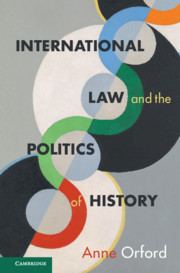Book contents
- International Law and the Politics of History
- International Law and the Politics of History
- Copyright page
- Contents
- Acknowledgements
- 1 Neoformalism and the Turn to History in International Law
- 2 Situating the Turn to History in International Law
- 3 History and the Turn to the International
- 4 History’s Lawyers
- 5 The Past in the Practice of International Law
- 6 The History of What?
- 7 Why Study the Past of International Law?
- Bibliography
- Index
1 - Neoformalism and the Turn to History in International Law
Published online by Cambridge University Press: 18 June 2021
- International Law and the Politics of History
- International Law and the Politics of History
- Copyright page
- Contents
- Acknowledgements
- 1 Neoformalism and the Turn to History in International Law
- 2 Situating the Turn to History in International Law
- 3 History and the Turn to the International
- 4 History’s Lawyers
- 5 The Past in the Practice of International Law
- 6 The History of What?
- 7 Why Study the Past of International Law?
- Bibliography
- Index
Summary
International lawyers are very familiar with the claim that international law has taken a turn to history since the tumultuous decade of the 1990s. As debates over the interpretation of past texts, events, and practices have intensified in the context of a rapidly changing field of international law, history has been presented as offering a silver bullet. While international lawyers are criticised for instrumentalising or mythologising the past in ways that are biased, partisan, and political, professional historical methods are presented as offering an objective, impartial, and evidence-based alternative. This chapter outlines the cross-disciplinary hermeneutic of suspicion that has structured the resulting debates over how the history of international law is understood. It sets out the assumptions underpinning that debate and explores its consequences for the way lawyers and historians represent the nature, functions, potential, role, and limits of international law.
Keywords
- Type
- Chapter
- Information
- International Law and the Politics of History , pp. 1 - 17Publisher: Cambridge University PressPrint publication year: 2021

